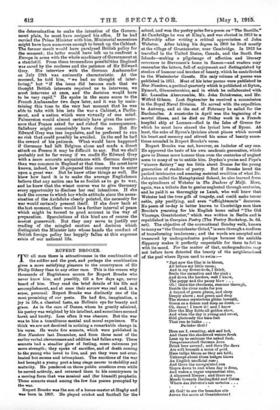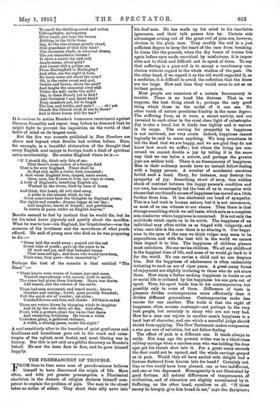RUPERT BROOKE.
TO all men there is attraetivenese in the combination of the soldier and the poet, and perhaps the combination gives a more satisfying pleasure to the countrymen of Sir Philip Sidney than to any other race. This is the reason why thousands of Englishmen mourn for Rupert Brooke who never knew him, and possibly, till a few days ago, never heard of him. They read the brief details of his Hie and accomplishment, and at once their sorrow was real and, in • sense, personaL Rupert Brooke was distinctly one of the most promising of our poets. He had fire, imagination, a joy in life, a classical taste, an Hellenic eye for beauty and grace. As in the case of Donne, whom he greatly admired, his poetry was weighted by his intellect, and sometimes seemed harsh and knotty. Less often it was obscure. But the war was to him a tumultuous mental and moral experience. We think we are not deceived in noticing a remarkable change in 'his verse. He wrote five sonnets, which were published in New Numbers last December, and from these most of the earlier verbal elevernesses and oddities had fallen away. These sonnets had a steadier glow of feeling, more calmness yet more strength ; they spoke of sacrifice, and of death coming to the young who loved to live, and yet they were not over- heated but serene and triumphant. The emotions of the war had brought a young poet a long stage nearer to stability and maturity. He pondered on those public, emotions even while he served actively, and returned them to his countrymen in a moving form that was musical and (for himself) prophetic. These sonnets stand among the few fine poems prompted by the war.
Rupert Brooke was the son of a house-master at Rugby and was born in 1887. He played cricket and football for the
school, and won the poetry prize fora poem on The Bestille."" At Cambridge he was at King's, and was elected in 1913 to a Fellowship after writing a critical appreciation of John Webster. After taking his degree in 1909 he lived mostly at. the village of Grantehester, near Cambridge. In 1913 he travelled is the United States, Canada, and the South Sea Islands—making a pilgrimage of affection and literary reverence to Stevenson's home in Samoa—and readers may remember the letters, full of enjoyment and distinguished by strokes of humour and touches of beauty, which he contributed to the Westminster Casette. His only volume of poems was published in 1911. Most of his late, poems were published he New Numbers, a poetical quarterly which is published at Bytom, Dynaock, Gloucestershire, and in which he collaborated with Mr. Laseelles Abercrombie, Mr. John Drinkwater, and Mr. Wilfrid Gibson. Last September he received a commission in the Royal Naval Division. He served with the expedition to Antwerp, and at the end of February he sailed for the Dardanelles. A sunstroke in April was the beginning of a mortal illness, and he died on Friday week in a French hospital ship at Lemnos—died in the Isles of Greece for which he must have shared the lyrical love of Byron_ At. least, the echo of Byron's lyricism about places which moved his heart and memory and stirred Ms sense of beauty some- times sounded in Rupert Brooke's verse.
Rupert Brooke was not, however, en imitator of any one. He approved the taste of his own academic generation, which gave to Donne more honour than even the centuries of neglect seem to many of us to entitle him. Dryden's praise and Pope's. "sincere flattery" say too little about Donna for the young generation of readers of poetry. Bet if Brooke loved the packed intricacies and amazing metrical erudition of what Dr. Johnson called the Metaphysical School. he also learned from the splendours of Webster in 27ta Duchess of Math. Here, again, was a tribute clue to genius neglected through centuries, and he paid it as thoroughly ex Lamb, who well knew that Webster had the true gift of tragedy, and could make terror noble, pity purifying, and even "affrightmente" decorous. No poem of to-day is better known to Cambridge men than Brooke's yearning for his English home called "The Old Vicarage, Grantchester," which was written in Berlin and is republished in Georgian Poetry (The Poetry Bookshop, Is. 6d. net). The objective of the conventional Sunday walk, known to many as " the Grantchester Grind,' is seen through a medium of transforming tenderness ; and the words are accepted and treasured by undergraduates perhaps because the amiable flippancy makes it perfectly respectable for them to fall in with its mood. For the matter of that, undergraduates inay not before have detected the beauty of the neighbourhood of the pool where Byron used to swim,-.
"Just now the 'Bac is in bloom,
All before my little room; And in my flower-beds I think, Smile the carnation and the pink ; And down the borders, well I know, The poppy and the pansy blow . .
Oh! therethe chestnuts, stammer through, Beside the river make for you A tunnel of green gloom, and sleep Deeply above ; and green and deep The stream mysterious glides beneath,
Green as a dream and deep as death.—
Oh, damn! I know it and I know How the May fields all golden show, And when the day is young and secret, Gild gloriously the bare feet That run to bathe .
Du Lieber Gott!
Here am I, sweating, sick and hot, And there the shadowed waters fresh Lean up to embrace the naked flesh. Temperamentvoli German Jeers Drink beer around ; and there the dews Are soft beneath a morn of gold. Here tulips bloom as they are told; lJnkempt about these hedges blows An English unofficial rase ; And there the -unregulated sun
Slopes dawn to rest when day is done, And wakes a vague unpunctnal star, A slippered Helper; and there aro Reads towards Haelingliald and Cotes Where don Betreten's not verboten . .
Ah God! to see the branches stir Across the moon at Grantelsester I
Ts smell the thrilling-sweet and rotten Unforgettable, unforgotten River smell, and hear the breeze Sobbing in the little trees. Say, do the elm-clumps greatly stand, Still guardians of that holy land?
The chestnuts shade, in reverend dream;
The yet unacademic stream ? Is dawn a secret shy and cold Anadyomene, silver-gold? And sunset still a golden sea From Unalingfield to Medingley? And after, ere the night is born, Do hares come out about the corn?
Oh, is the water sweet and cool, Gentle and brown, above the pool? And laugh, the immortal river still Under the mill, under the mill ?
Say, is there Beauty yet to find ?
And Certainty and Quiet kind? Deep meadows yet, for to forget The lies, and truths, and pain ? . . . oh! yet Stands the Church clock at ten to three?
And is there honey still for tea? "
It is curious to notice Brooke's humorous resentment against German formality and rigour long before he dreamed that he might fight to prevent the imposition on the world of that habit of mind on its largest scale.
But the five war sonnets published in Nets Numbers are above and beyond what Brooke had written before. Here, for example, is a beautiful elaboration of the thought that every English soul enjoys in foreign lands a kind of spiritual extra-territoriality. He creates England where he is "If I should die, think only this of mei
That there's some corner of a foreign field That is for ever England. There shall be In that rich earth a richer dust concealed ; A dust whom England bore, shaped, made aware,
Gave, once, her flowers to love, her ways to roam, A body of England's, breathing English air,
Washed by the rivers, bleat by suns of home.
And think, this heart, all evil shed away, A pulse in the eternal mind, no less Gives somewhere back the thoughts by England given; Her sights and sounds ; dreams happy as her day ; And laughter, learnt of friends ; and gentleness, In hearts at peace, under an English heaven."
Brooke seemed to feel by instinct that he would die, but he let his mind hover joyously and quietly about the sacrifice. What he was to lose—his England, his Grantcheater—was the measure of the loveliness and the sacredness of what youth offered. He said of young men who died as he was preparing to die
Them laid the world away ; poured out the red
Sweet wine of youth; gave up the years to be Of work and joy, and that unhoped serene That men call age ; and those who would have been, Their sons, they gave—their immortality."
Perhaps the best of the sonnets is that entitled "The Dead'
" These hearts were woven of human joys and cares, Washed marvellously with sorrow, swift to mirth. Tho years had given them kindness. Dawn was theirs, And sunset, and the colours of the earth.
These had seen movement, and heard music ; known Slumber and waking ; loved; gone proudly friended ; Felt the quick stir of wonder; sat aloes ;
Touched flowers and furs, and cheeks. All this is ended. There are waters blown by changing winds to laughter
And lit by the rich skies, all day. And after, Frost, with a gesture, stays the waves that dance
And wandering loveliness. He leaves a white Unbroken glory, a gathered radiance,
A width, a shining peace, under the night."
A. soul sensitively alive to the beauties of quiet gentleness and kindliness and homeliness goes out in the crash and catas- trophe of the ugliest, most brutal, and most blaring war in history. But this is not said as a pitiful discovery on Brooke's behalf. He saw the issue face to face, and he gave himself happily.



































 Previous page
Previous page